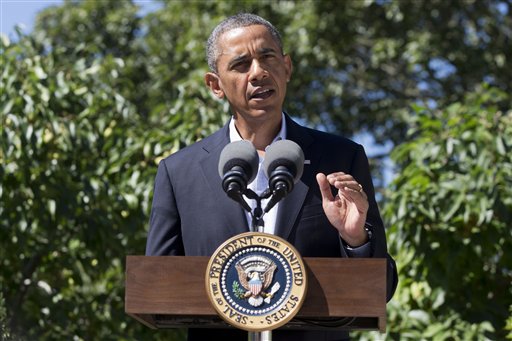CHILMARK, Mass. — President Barack Obama scrapped plans for joint American-Egyptian military exercises Thursday, announcing the first concrete U.S. reaction to the spiraling violence in and around Cairo but stopping well short of withholding $1.3 billion in annual American military aid.
The measured response underscored the Obama administration’s concern that revoking financial support could further destabilize Egypt, the Arab world’s most populous country and an important U.S. ally in a combustible region. And it was unclear whether the cancellation of the military exercises, known as Bright Star, would have any impact in stemming the violence that threatens the interim Egyptian government’s promises of a political transition following the ouster of President Mohammed Morsi.
The president, speaking from his rented vacation home on Martha’s Vineyard, warned that continued fighting would lead Egypt down a “dangerous path,” and he called on both the government and protesters to show restraint. He said that while close engagement with Egypt was in U.S. national security interests, “our traditional cooperation cannot continue as usual when civilians are being killed in the streets and rights are being rolled back.”
In a statement, Egypt’s interim government warned that Obama’s statement, “while it’s not based on facts … can empower the violent militant groups’ and encourage them in their destabilizing discourse.”
Egypt is facing “terrorist actions targeting government and vital institutions” by “violent militant groups,” the statement said. The interim government expressed sadness for the killings of Egyptians and pledged that it’s working to restore law and order.
More than 600 were confirmed killed and thousands had been wounded since Wednesday in clashes between Egypt’s military-backed interim government and Morsi supporters. The government has declared a nationwide state of emergency and nighttime curfew.
Egypt’s political upheaval has put the Obama administration in an awkward diplomatic position. The White House strongly supported the pro-democracy protests that forced out longtime autocrat Hosni Mubarak in 2011, but it has refused to condemn the military’s removal of Morsi, who was subsequently elected in the country’s first democratic balloting.
If the U.S. were to declare Morsi’s ouster a coup, the Obama administration would be legally required to cut off military aid.
U.S. officials informed Egypt’s leaders Thursday morning of the decision to cancel the Bright Star exercises. Obama also ordered his national security team to review other steps the administration might take in response to the political upheaval.
Congressional officials in both parties welcomed the decision but pressed Obama to go further.
Democratic Sen. Patrick Leahy of Vermont said that “aid to the Egyptian military should cease unless they restore democracy.” And Sen. Rand Paul, R-Ky., urged Obama to “stop skirting the issue, follow the law, and cancel all foreign aid to Egypt.”
The careful U.S. reaction to the deadly violence has also angered and confused many Egyptians, particularly supporters of Morsi, a senior leader of the Islamist Muslim Brotherhood. He was elected in 2012 after pro-democracy protests and international pressure — including from the U.S. — forced Mubarak from power.
Just one year into his term, Morsi faced separate protests, with millions of Egyptians gathering in the streets to call for him to step down. They accused him of giving the Muslim Brotherhood sweeping influence and failing to enact promised economic reforms.
Obama, addressing what he called the “complexity of the situation,” said Thursday that the U.S. would not take sides in Egypt’s political struggles and could not be responsible for determining its future.
“I know it’s tempting inside of Egypt to blame the United States or the West or some other outside actor for what’s gone wrong,” he said. “We’ve been blamed by supporters of Morsi. We’ve been blamed by the other side, as if we are supporters of Morsi.”
“That kind of approach will do nothing to help Egyptians achieve the future that they deserve,” Obama said.
The military-backed government has pledged to amend the Islamist-backed constitution adopted under Morsi last year. The interim leaders have also promised to hold parliamentary and presidential elections early next year.
Defense Secretary Chuck Hagel, in a phone call with Egyptian Defense Minister Abdel Fattah al-Sisi, suggested there could be further consequences for the decades-long military ties between the two countries if the interim government does not quickly move toward political reconciliation.
“The Department of Defense will continue to maintain a military relationship with Egypt, but I made it clear that the violence and inadequate steps toward reconciliation are putting important elements of our longstanding defense cooperation at risk,” Hagel said in a statement following the call.
The Bright Star maneuvers — long the centerpiece of U.S. military cooperation with Egypt — were scheduled to begin next month and last for three weeks. Several other countries, including Turkey, Jordan and Britain, have also participated in the ground, air and naval exercises.
The U.S. also postponed the once-every-two-years exercises in 2011. Egypt at the time was grappling with the fallout from the revolution that ousted Mubarak.
Also Thursday, the State Department updated its travel warning for Americans in Egypt, telling U.S. citizens to defer travel there and urging Americans living in Egypt to depart. The travel warning stated that the political unrest stemming from the “change of government” showed little sign of abating.
Send questions/comments to the editors.




Success. Please wait for the page to reload. If the page does not reload within 5 seconds, please refresh the page.
Enter your email and password to access comments.
Hi, to comment on stories you must . This profile is in addition to your subscription and website login.
Already have a commenting profile? .
Invalid username/password.
Please check your email to confirm and complete your registration.
Only subscribers are eligible to post comments. Please subscribe or login first for digital access. Here’s why.
Use the form below to reset your password. When you've submitted your account email, we will send an email with a reset code.